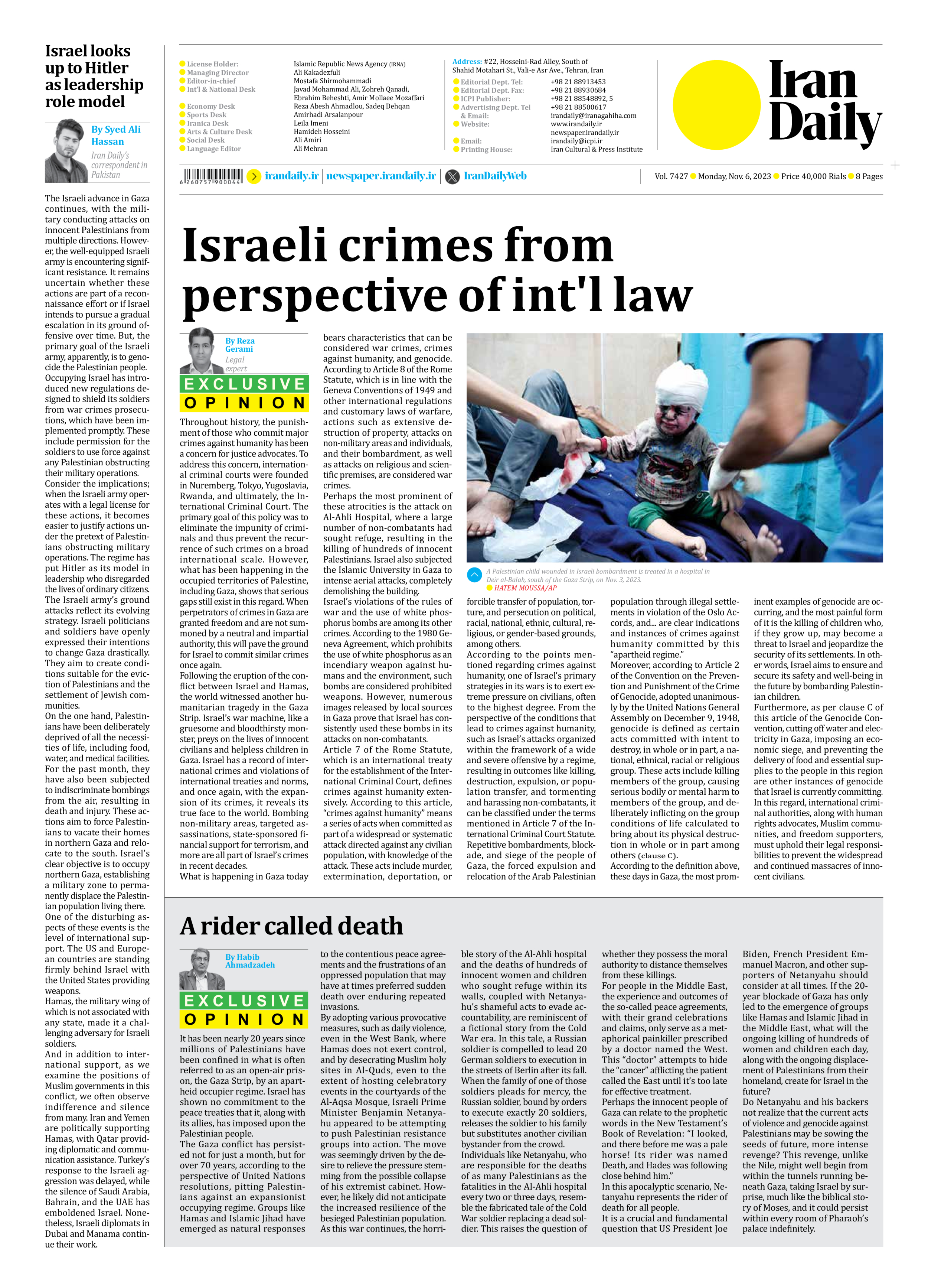
Israeli crimes from perspective of int’l law
By Reza Gerami
Legal expert
Throughout history, the punishment of those who commit major crimes against humanity has been a concern for justice advocates. To address this concern, international criminal courts were founded in Nuremberg, Tokyo, Yugoslavia, Rwanda, and ultimately, the International Criminal Court. The primary goal of this policy was to eliminate the impunity of criminals and thus prevent the recurrence of such crimes on a broad international scale. However, what has been happening in the occupied territories of Palestine, including Gaza, shows that serious gaps still exist in this regard. When perpetrators of crimes in Gaza are granted freedom and are not summoned by a neutral and impartial authority, this will pave the ground for Israel to commit similar crimes once again.
Following the eruption of the conflict between Israel and Hamas, the world witnessed another humanitarian tragedy in the Gaza Strip. Israel’s war machine, like a gruesome and bloodthirsty monster, preys on the lives of innocent civilians and helpless children in Gaza. Israel has a record of international crimes and violations of international treaties and norms, and once again, with the expansion of its crimes, it reveals its true face to the world. Bombing non-military areas, targeted assassinations, state-sponsored financial support for terrorism, and more are all part of Israel’s crimes in recent decades.
What is happening in Gaza today bears characteristics that can be considered war crimes, crimes against humanity, and genocide. According to Article 8 of the Rome Statute, which is in line with the Geneva Conventions of 1949 and other international regulations and customary laws of warfare, actions such as extensive destruction of property, attacks on non-military areas and individuals, and their bombardment, as well as attacks on religious and scientific premises, are considered war crimes.
Perhaps the most prominent of these atrocities is the attack on Al-Ahli Hospital, where a large number of non-combatants had sought refuge, resulting in the killing of hundreds of innocent Palestinians. Israel also subjected the Islamic University in Gaza to intense aerial attacks, completely demolishing the building.
Israel’s violations of the rules of war and the use of white phosphorus bombs are among its other crimes. According to the 1980 Geneva Agreement, which prohibits the use of white phosphorus as an incendiary weapon against humans and the environment, such bombs are considered prohibited weapons. However, numerous images released by local sources in Gaza prove that Israel has consistently used these bombs in its attacks on non-combatants.
Article 7 of the Rome Statute, which is an international treaty for the establishment of the International Criminal Court, defines crimes against humanity extensively. According to this article, “crimes against humanity” means a series of acts when committed as part of a widespread or systematic attack directed against any civilian population, with knowledge of the attack. These acts include murder, extermination, deportation, or forcible transfer of population, torture, and persecution on political, racial, national, ethnic, cultural, religious, or gender-based grounds, among others.
According to the points mentioned regarding crimes against humanity, one of Israel’s primary strategies in its wars is to exert extreme pressure on civilians, often to the highest degree. From the perspective of the conditions that lead to crimes against humanity, such as Israel’s attacks organized within the framework of a wide and severe offensive by a regime, resulting in outcomes like killing, destruction, expulsion, or population transfer, and tormenting and harassing non-combatants, it can be classified under the terms mentioned in Article 7 of the International Criminal Court Statute.
Repetitive bombardments, blockade, and siege of the people of Gaza, the forced expulsion and relocation of the Arab Palestinian population through illegal settlements in violation of the Oslo Accords, and... are clear indications and instances of crimes against humanity committed by this “apartheid regime.”
Moreover, according to Article 2 of the Convention on the Prevention and Punishment of the Crime of Genocide, adopted unanimously by the United Nations General Assembly on December 9, 1948, genocide is defined as certain acts committed with intent to destroy, in whole or in part, a national, ethnical, racial or religious group. These acts include killing members of the group, causing serious bodily or mental harm to members of the group, and deliberately inflicting on the group conditions of life calculated to bring about its physical destruction in whole or in part among others (clause C).
According to the definition above, these days in Gaza, the most prominent examples of genocide are occurring, and the most painful form of it is the killing of children who, if they grow up, may become a threat to Israel and jeopardize the security of its settlements. In other words, Israel aims to ensure and secure its safety and well-being in the future by bombarding Palestinian children.
Furthermore, as per clause C of this article of the Genocide Convention, cutting off water and electricity in Gaza, imposing an economic siege, and preventing the delivery of food and essential supplies to the people in this region are other instances of genocide that Israel is currently committing. In this regard, international criminal authorities, along with human rights advocates, Muslim communities, and freedom supporters, must uphold their legal responsibilities to prevent the widespread and continued massacres of innocent civilians.







